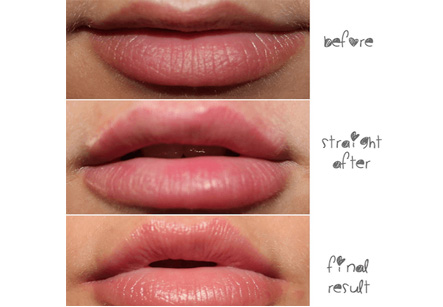Lip Augmentation
Introduction
Lip augmentation is used to make the lips fuller and plumper. It also reduces wrinkling around mouth, near lips. Lips can be augmented by injecting them with collagen or fat from different sites of patient’s body. For results to be permanent, this procedure has to be repeated. New implant materials have been introduced which give long lasting results as compared to collagen or fat.
Patient requirements for lip augmentation are as given below:
1. The candidate for lip augmentation should have good general health.
2. Absence of infectious diseases like oral herpes.
3. Absence of connective tissue disorders like- blood coagulation disorders or diabetes which may disturb the process tissue healing.
A realistic approach is required for better outcomes in these procedures. It is prudent to expect enhancement in natural look rather than drastic changes in facial appearance after the procedure.
All details of the allergies or any medications are to be informed to the clinician when patient’s medical history gets discussed. A few diseases or conditions like blood coagulation disorders, diabetes, and circulatory disorders can increase the risk of complications in this type of surgeries. Smoking can be one of the risk factors for the complications.
Surgical Procedure
Procedure:
1. Patients lips are injected with natural material like own body fat or synthetic biocompatible material is implanted in the lips.
2. Commonly a single injection suffices to give desired effects which might be temporary or might last for shorter duration. Therefore, these injections may need to be repeated periodically.
3. In case of implants of synthetic material, proper placement of the injected material becomes very important. A natural collagen sheet made from donated skin is very commonly used implant. It is inserted through small incisions made at the corners of the mouth. Once the implant is in desired place, it eventually becomes integrated with the natural tissues surrounding it.
We have all the information you need about public and private Cosmetic / Plastic clinics that provide Lip Augmentation in Iran, Islamic Republic Of

Injectable fillers are also used in lip augmentation surgeries. The cosmetic surgeon may use local anesthesia to make patient more comfortable while injecting the filler. A couple of such injectables are enlisted below:
1. Synthetic microbeads of polymethylmethacrylate (PMMA) that are suspended in partially denatured Bovine (cow) collagen are used. These show more staying property as compared to fat injections or standard collagen. But there is a risk of allergy as the collagen being used can be partially denatured.
2. Patients own body collagen can be extracted and sent to a laboratory where it gets processed into an injectable form. As this filler is made of patients own body collagen, there lies no risk of any allergy. But there is huge possibility of the body collagen being reabsorbed, so effects might not last for long. Collagen extraction is a surgical procedure after which it can be sent to a lab for process, so a second visit becomes mandatory for the injection.
3. Bovine Collagen is also used directly. It is extracted from cows. Its effects last temporarily, for a shorter span ranging from four weeks to twelve weeks. This filler can cause allergic reaction.
Benefits of the lip augmentation:
1. Patient can return home immediately and resume normal activities for nonsurgical procedures; depending on the procedure and materials used, whereas the recovery period may be within a week for surgical procedures.
2. Collagen, fat injections or similar temporary procedures can be appealing to patients who want to experiment with a fuller-lipped look on a temporary basis.
Some other considerations to be taken care of:
1. Prolonged redness, itching, swelling or firmness at the injected site, etc. are common allergic reactions developed post- lip augmentation. Normal swelling and bruising lasts from three days to a week.
2. Bleeding, lip asymmetry, shift or dislocation of the implant can be other major post-surgical complications.
3. Patients with an allergy profile to lidocaine (a local anesthetic agent) should avoid lip augmentation.
4. Patients having serious allergy history and those with reaction to the pre-treatment collagen skin test should not consider lip augmentation.